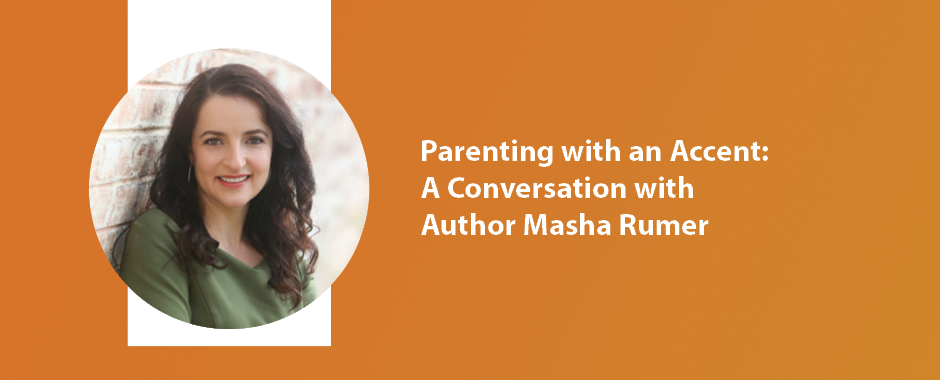As an award-winning journalist, Masha Rumer excels at weaving personal stories together with thorough research, resulting in a book that is both a parenting resource and a heartfelt memoir of the immigrant experience. Associate Director of the Center for Children and Youth, Elisa Magidoff, sat down with Rumer for a brief interview about her new book, Parenting with an Accent.
Elisa Magidoff: Can you talk a little bit about your background, and about your personal connection to this topic?
Masha Rumer: Absolutely. The reason I wrote this book is because when I became a parent, I realized a book like this did not exist and I really wished there were resources of this sort. The more I talked to other parents, whether they were of my background—which is former Soviet immigrant—or of any other background, we all shared very similar concerns [regarding] acculturation, finding our tribe, or raising our kids to be bilingual. We all shared very similar experiences and frustrations and joys. I wished there was a resource for that, so I decided to write it.
EM: What was the most surprising thing you found in your research?
MR: So many surprising things! Probably the biggest one is how fragile our languages are. The grandchildren of immigrants tend to not speak their heritage language at all. For those of us who want to maintain that connection to our language, which is also part of our identity, it’s really important to try to do the best we can.
Part of my impetus for writing the book, and also the conclusion I came up with, is we also feel so guilty for not doing enough or following all these expert recommendations for how to raise your child to be perfectly bilingual. I think it’s very important to celebrate the wins that we have and to meet our children and ourselves where we’re at as opposed to following sometimes very hard to achieve standards and then get discouraged and give up all together.
EM: What made you want to explore this topic further and turn it into a book?
MR: I felt like there needed to be advice, certainly; but while this book does have advice from a number of experts, there was a need to kind of commiserate with people and to hear their stories. All of us have different experiences as immigrants, as parents … and all [that is reflected] in the book.
The book is not just about bilingualism of course. It’s also about discrimination or digging into the past of our immigration stories. Some bad dating stories made it in as well, and how people navigate multicultural relationships for those of us who have a partner from a different culture or background or religion.
There’s a whole bunch in the book that I’m hoping will be a resource for people who read it.
EM: How has the process of writing this book informed your own parenting?
MR: I learned to chill out. That probably is my most important conclusion. And, as I mentioned, celebrate the wins. I’ve had a different relationship with my immigrant heritage, as I think many people do, but I learned to celebrate it so much more. Now when I’m outside and I hear foreign speech or I hear an accent, I just rejoice. It makes me so happy to hear. I feel like throughout my writing of this book I started honoring my background and the fact that I’m from somewhere else more than I ever have before and celebrating that in others no matter where they’re from.
EM: Is there anything else you’d like to share with us about your book?
MR: Only that I hope people find entertainment and education in it and that it resonates with them in their own personal way.
To hear more from author Masha Rumer, join us on January 20, 2022 for a FREE virtual community discussion about her book Parenting With an Accent. Learn more and register here.

